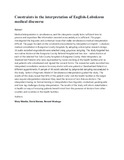| dc.contributor.author | Masika, Mary | |
| dc.contributor.author | Barasa, David | |
| dc.contributor.author | Mudogo, Benard | |
| dc.date.accessioned | 2023-05-19T11:15:03Z | |
| dc.date.available | 2023-05-19T11:15:03Z | |
| dc.date.issued | 2023-05-07 | |
| dc.identifier.uri | https://doi.org/10.58256/jmll.v4i1.1141 | |
| dc.identifier.uri | https://www.royalliteglobal.com/languages-and-literatures/article/view/1141 | |
| dc.identifier.uri | http://ir-library.mmust.ac.ke:8080/xmlui/handle/123456789/2194 | |
| dc.description.abstract | Medical interpretation is simultaneous, and the interpreter usually lacks sufficient time to process and reproduce the information received as accurately as is sufficient. This paper investigated the linguistic and contextual issues that make simultaneous medical interpretation difficult. The paper focused on the constraints encountered by interpreters in English - Lubukusu medical consultation in Bungoma County Hospitals. By adopting a descriptive research design, 36 audio recorded respondents were selected using purposive sampling. The study targeted two non-native doctors at the Bungoma County Referral Hospital and two non - native doctors at each of the selected five Sub-County hospitals in Bungoma County, their interpreters, six Standardised Patients who were represented by nurses working at the health facilities and six real patients who volunteered and signed the consent forms. The researcher audio recorded two interpreted consultation sessions for every doctor with one patient or Standardised Patient on different appointments. A sample of 66 words selected by judgmental sampling was analysed in this study. Setton’s Pragmatic Model of Simultaneous Interpretation guided the study. The results of this study reveal that 40% of the patient’s who visit the health facilities in the target area require interpretation whenever they need the services of non-Bukusu doctors. The interpreters having no formal training in interpretation face linguistic, contextual, paralinguistic and time lag challenges during interpretation. The results of the study will inform stakeholders in health on ways of ensuring patients benefit most from the presence of doctors from other counties and countries in the health facilities. | en_US |
| dc.language.iso | en | en_US |
| dc.publisher | Research Journal in modern Language and literature | en_US |
| dc.subject | Constraints,interpretation, English-Lubukusu, medical, discourse | en_US |
| dc.title | Constraints in the interpretation of English-Lubukusu medical discourse | en_US |
| dc.type | Article | en_US |

